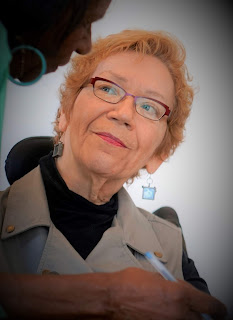In response to your request for stories about Deborah
By Leslie A. Robinson, Ph.D.
I met Deborah when I was a clinical psychology doctoral student receiving training at the Baptist Rehab facility. It was about 1988, and Deborah occasionally came to our team meetings. I could sense that many of the staff were somewhat afraid of her, but it was obvious to me that she was fighting on the side of good, with a wicked sense of humor in the process! So I made a point to get to know her and to learn all I could from her.
I later worked for Baptist as a young psychologist, and she was my compatriot there. I knew I could trust Deborah to tell me not only where the law stood, but also how to get creative in making sure patients' needs were met.
She was kind enough to tell me how she lived with her illness, and in the process I began to really understand that it is possible to live a life beyond disability. That, essentially, is what Deborah did.
These lessons came home in 1999, when I was diagnosed with cancer and underwent an amputation. I knew it was possible to deal with this, because I knew Deborah dealt with more. Further, she offered real empathy to me, even though my amputation was small in comparison to her challenges.
I will always be grateful for her support during that time.
For the past 15 years I've been an Associate Professor at the U of M. As head of our track in health psychology, I have offered a range of graduate classes designed to help doctoral students learn how to treat individuals with disabilities. Toward this end, Deborah would often lecture at my request.
The students, needless to say, found her to be incredible. Deborah was particularly effective because she didn't mind talking about her own challenges, as well as educating students about the rights of people with disabilities.
Her stories were always entertaining, and I felt very fortunate to have her in our classroom! In short, Deborah has played an integral role in my career development by giving me both personal support and insight into the strength of people with disabilities.
I will miss her deeply.




